The Sports Media LGBT+ Review of 2020
New networks and inspirational stories feature among Jon Holmes’ LGBT+ sports highlights of the year…
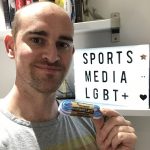
Before getting stuck into this retrospective (and look-backs aside, you’ll probably be glad to see the back of 2020), I’m going to get introspective.
Everyone’s reflected on their emotional state at some point this year, and for those in our community of LGBT+ people and allies in sport, that self-analysis is often intense. Many of us are conditioned to keep our monologues internal – we fear being judged, we worry about accusations of ‘navel-gazing’, and we talk ourselves out of talking out loud. It just feels safer that way.
It also seems that when we most need to declutter our brains, we discover that we’ve hoarded certain emotions for so long that we can’t let go of them – a mental health conundrum that even Marie Kondo would struggle to sort out.

I thought about this a lot in August when chatting to Josh Rudd, the founder of Pride in Water, the LGBT+ network for aquatic sports. Josh is a performance lifestyle advisor who noticed his chats with athletes during lockdown were opening up – with the Olympics bumped to 2021, and training on hiatus, parts of the athletes’ lives that previously felt out of sync started to fall into place. “These conversations became far more philosophical, and often about life beyond sport,” said Josh. “Identity was a big piece.”
I’m sure everyone involved with Sports Media LGBT+ will agree when I say the creation and evolution of other LGBT+ networks in sport felt like one of 2020’s big successes. Several were launched; in motorsport, our partners Racing Pride began to accelerate; and we know more groups are already in the pipeline for 2021.
Crucially, what they offer is a space to connect. We often dwell on how niche it is in sport to be lesbian, gay, bi, and trans for an athlete, coach, administrator, or journalist – but that might just be because it feels so tough to find an ‘appropriate time’ to even hint at sexuality or gender identity. Usually the pause button has to get hit first, and sport is so full-on and helter-skelter that we all tend to get stuck on ‘play’. The disruption caused by the pandemic produced more time for dialogue, at least.

So here, month by month, and picking out key moments and choice content along the way, is my rainbow-themed sports review of 2020.
It’s got a British focus – yet with Pride flags waved more than the Union Jack – and some of my selections might be considered self-indulgent (a lot of the links are taken from our coverage on Sky Sports), but I hope it sparks a little inspiration as we go into shiny and new 2021.
Do let me know your thoughts – and inevitably, whatever I missed!
An icebreaker in hockey
Few sports felt the side-effects of the coronavirus crisis as acutely as ice hockey. The most-watched indoor sport in the UK, Elite League average attendances were up nearly 7% before the 2019-20 season was shut down. The EIHL’s first-ever Pride Weekend in late January was well supported by the clubs and popular with fans; Luke Fisher, the league’s media manager, deserves to take a lot of credit for the organisation.
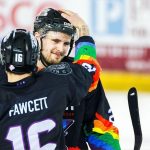
When Manchester Storm defenceman Zach Sullivan posted to his social media accounts on a matchday morning to share that he is bisexual, and how proud he is to wear a rainbow-coloured jersey, the initiative’s impact was obvious. An outstanding ambassador for hockey and for being his authentic self, Sully’s story resonated throughout the year. Hockey fans can’t wait for the rinks to re-open and for their teams to get out on the ice again.
Must-read: Zach Sullivan on coming out and how hockey embraced him (Sonny Sachdeva, Sportsnet.ca)
History made in History Month
If we’d known that February would be the last full month of normality, we’d have made more of it – but regardless of hindsight, it was still crammed with celebrations. Firstly, some notable moments for our network – the release of the Rainbow Ready media and comms resources, and a quiz night that raised nearly £1,000 for Diversity Role Models. We were excited to see the iconic Justin Fashanu inducted into the National Football Museum’s Hall of Fame, an event held during the Football v Homophobia campaign’s annual Month of Action which was again marked nationwide.
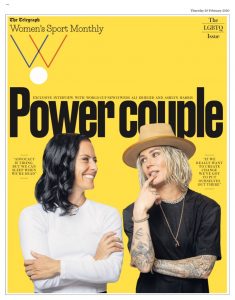
In media, Jo Currie’s BBC Sport interview with West Ham’s Gilly Flaherty was heartbreaking but also uplifting – and crucially, it got more people talking. Telegraph Women’s Sport produced an LGBTQ special edition – cover stars Ali Krieger and Ashlyn Harris were featured in one of several illuminating interviews, and Beth Fisher’s op-ed on how lingering stereotypes continue to create a participation paradox for women and girls was particularly strong. Meanwhile on Sky Sports, Amazin LeThi and grassroots athletes Faye Easton, Ubaid-ul Rehman and Emily Chong addressed the important issue of representation, and the challenges of being both Asian and LGBT+.
As Storm Dennis menaced The Stoop, there was a significant occasion at Harlequins – the first Pride Game held by a professional rugby union club. Quins’ customer experience manager James Swanson oversaw operations – a series of short films, new academic research, a lively panel discussion hosted by Nick Heath (whose ‘Life Commentaries’ gave us big laughs in 2020), and the matchday itself, with rainbow smoke flares and an atmosphere warmer and more welcoming than the weather. More Pride Games please!
Must-read: How women’s sport is a paradox for the LGBTQ community (Beth Fisher, Telegraph Women’s Sport)
Stop, look, listen to your heart…
After a distinctly uneasy feeling around the Cheltenham Festival towards the start of March, the suspension of sporting events due to COVID-19 followed swiftly. Either side of Britain going into lockdown on March 23, both Euro 2020 and the Tokyo Olympics were postponed.
We all turned our attention to Zoom calls and Netflix binges, but our football skills found a welcome outlet in the #BinTransphobia challenge from Football v Transphobia, whose Week of Action ended the month. Allies and their trans team-mates shared their stories, including in an article I enjoyed compiling for Sky Sports. Also on a football theme, I was immensely grateful to Alex Stone at FIFA for providing me with an opportunity to talk about Sports Media LGBT+ on their website.

A wedding photo taken on the other side of the world, in Queensland, caught my attention. World Cup-winning England cricketer Lauren Winfield married Courtney Hill, the reigning Woman of Steel who led Leeds Rhinos to the title in 2019. The couple spoke to Vithushan Ehantharajah about love and life, with Lauren explaining how her self-confidence had grown over time through being with Courtney – “it took me four years to build up the courage to be more open”.
The interview ran in The Independent in March and the couple would return to the UK three months later, with Lauren going on to skipper the Northern Diamonds to the final of the Rachel Heyhoe-Flint Trophy, and Courtney – who was a fast bowler before switching sports – helping out in a coaching role after women’s rugby league had failed to restart.
Must-read: 10,000 miles from home, newly-married Lauren Winfield is keeping her sunny disposition (Vithushan Ehantharajah, The Independent)
Clearing the hurdles
April began with a bang as the starting pistol was fired for the Athletics Pride Network, a landmark LGBT+ group and the first in Britain to be officially launched with the backing of the national governing body. Coach Andy Paul was a key instigator, along with former Olympic javelin thrower Shelley Holroyd – and in a gripping podcast listen, she also spoke to Outsports’ Cyd Zeigler for Five Rings To Rule Them All about her own gruelling battle against coronavirus. Shortly after, I was hugely grateful to hurdler Ethan Akanni – one of the UK’s rising track stars – for agreeing to share his coming out story in public for the first time.
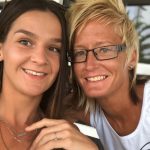
Championed by DIVA Magazine, the first Lesbian Visibility Week was held to conclude the month, and women’s sport was central to its success. Swimming coach Emma Collings-Barnes wrote movingly about her journey; Beth Fisher and her girlfriend, the footballer Anita Asante, discussed their relationship; boxer Terri Harper – whose world-title win was one of the greatest achievements of 2020 by any out athlete – did the same alongside her fiancee, Jen Hayden; and also on Sky Sports, a revealing Q&A by Jess Creighton with the sprinter Corinne Humphries addressed themes of race, representation, and realisation.
On Sports Media LGBT+, we published approximately 50 website articles across the course of 2020 (a big increase on the previous year’s output) and two of the most popular went out in April – a Q&A with the BBC’s Jo Currie about working in sports media, put together by her fellow network member Zoe Vicarage; and a deep dive into visibility in women’s football by contributor Sophie Lawson. Sophie made several pertinent points – as could be seen, coincidentally, by the name of an England player being exchanged post-publication for that of a different sportswoman on a DIVA list titled ‘Visible Lesbian 100’. The list’s compilers had only good intentions; we again pondered personal privacy and its boundaries in the age of Instagram.
Must-read: Lesbian visibility in football often means blurred lines (Sophie Lawson, Sports Media LGBT+)
The responsibility of the reporter
In May, a spate of articles about ‘secret gay footballers’ started up in The Sun newspaper, inevitably stirring up speculation over who the players might be (I’ll come back to this later). The need for more understanding about the knock-on effects of such stories was referenced by Coronation Street actor Nathan Graham in a Sky Sports article about a major storyline for his character in the soap. “Breaking the silence is about feeling supported,” he said. “When you’re ready, you’re ready. There should be no timeframe put on anybody to come out and nobody should feel pressured to do so.”
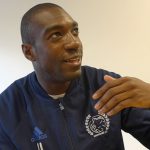
Graham was speaking to mark the International Day Against Homophobia, Biphobia and Transphobia, alongside the FA’s diversity and inclusion officer and Stonewall FC captain, Jay Lemonius. The “disconnect” between school and academy – there’s often an acknowledgement about what it means to be LGBT+ in the former, but it’s rarely if ever mentioned in the latter environment – is part of the ongoing cultural challenge in men’s football, says Jay.
In mid-May, and as lockdown lurched on and on, Mental Health Awareness Week focused our minds on how to look out for ourselves and one another. In a Q&A on our website, sports reporter Jak Ball explained how making connections with other LGBT+ people on social media and eventually coming out had been hugely beneficial for his wellbeing. I really relate to Jak’s journey – partly, perhaps, because I’m a Devon boy like him – and I’m sure it gave others confidence too.
Must-read: ‘Coming out lifted a mental weight off my shoulders’ (Q&A with Jak Ball, Sports Media LGBT+)
Protests and progress
Our great friend Michael Gunning kicked off a series of Sports Media LGBT+ interviews called My Pride in Sport. As always, his joie de vivre and passion for swimming shone through, but his call to fight for true equality and social justice was the overriding message. It’s still uppermost in our minds – we vow to keep listening, learning, and appreciating the real-world meaning of Black Lives Matter. Four of Michael’s fellow Stonewall Sport Champions – John Dickinson-Lilley, Amazin LeThi, and Lizzie Williams – also gave us their interpretations of Pride.
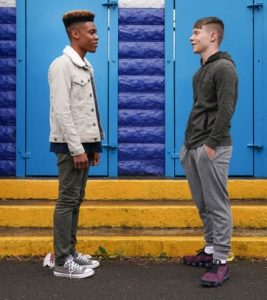
Following on from Corrie, another TV drama gave us the character of a male footballer coming out. I thought CBBC’s Jamie Johnson handled the storyline of Dillon and Elliot superbly (there was both sensitivity and chemistry, all before teatime!), while the additional discussion – on social media, on Newsround, on BBC Breakfast, and in a BAFTA Kids & Teens panel chat with the show’s writer and cast members, chaired by Alex Kay-Jelski – helped younger audience members and adults alike to put it all in context.
Sports Media LGBT+ proudly accepted an invitation to support Wales legend Jess Fishlock’s short film that played with the animation ‘LaGolda: Game Changer’ – thank you to creator George Valencia. The Covid situation around world soccer meant some big plans had to be shelved but there’s a timeless quality to the cartoon and we’re sure it will only grow as an educational asset.
Towards the end of June, the former footballer Thomas Beattie wrote an essay for ESPN titled ‘My hidden journey: A professional soccer player reveals he is gay’. An Englishman abroad, he emerged as a vital new voice to aid the game’s understanding of LGBT+ mental health, and how gay male athletes in particular can become subsumed in sport to such a degree that it ends up causing confusion and unhappiness.
Must read: How Jess Fishlock unlocked her ‘secret superpower’ (Sky Sports)
Pride in podcasting
I’ve saved Jack Murley’s BBC LGBT Sport Podcast for this point in proceedings, because his July episode with British gymnast Luke Strong was one of my favourites of the year. Having spent my university days in Liverpool, I have a great affection for the city and for the authenticity of its people. Luke’s honesty about his confusion around growing up bi and how he’d never done ‘the whole coming out thing’ was refreshing. “My coach asked me about my sexuality in 2010 [when Luke was 17] and I remember crying but not knowing why,” he explained.
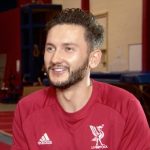
There were several milestones for Jack and the pod this year – the 100th episode with a great guest in Chris Mosier, a BBC Five Live special, an SJA British Sports Journalism awards nomination – and consistently, enthralling conversations. Along with Luke and Chris, my favourites included UFC fighter Molly ‘Meatball’ McCann and wrestler Cassius. Those guests and more are all included in the two-part ‘Best Bits of 2020’ edition, which is out now to conclude the year.
Also in the month, Football Pride – a one-day online festival powered by Pride Sports and Football v Homophobia – delivered a wealth of accessible content, with Lou Englefield, Natalie Washington, Gary Ginnaw and Sam Timms key to making it all happen. Sports Media LGBT+ also helped to amplify LEAP Sports Scotland’s PrideActive Conversations, helmed by Emma Dodds and also Andrew Henderson, whose writing on the Pride of the Terraces website was always essential reading, with Kristen Fraser, Sammy Walker, and Abbi Aitken-Drummond all interviewed in July.
Must read: Football Pride: ‘This can be the spark that gets more people into the game’ (Jack Murley, BBC Sport)
Driving change, diving in
Midway through July, following a workshop in London earlier in the year, World Rugby proposed a blanket ban on trans women playing women’s rugby, citing safety concerns. For a sporting community that has long valued inclusion and who more often than not have welcomed and accommodated people of all shapes and sizes, there was to be no chorus of approval for these measures. Powered by the voices of women’s rugby players from clubs in the US, Canada and New Zealand, the pushback began in earnest in August.
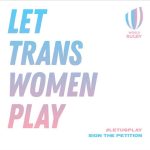
Outsports and International Gay Rugby worked together on a significant series of articles which profiled trans women players such as Grace McKenzie, Isabella Macbeth and Shoshauna Gavin. Later in the year, when World Rugby issued ‘guidelines’ about the ban, several unions – including the RFU in England – rejected the recommendations, at least at a community level, insisting robust research is required.
At the start of the month, in the slipstream of the Athletics Pride Network, and also mentioned in my introduction, Pride in Water was launched with the backing of British Swimming. Former world champion Mark Foster joined Michael Gunning in supporting the initiative – “I know for me as a swimmer, this would have been helpful,” he said – and for founder Josh Rudd, the growth potential in a network that also includes diving, water polo, synchronised swimming, and triathlon (crossing over with the APN) is huge.
Must read: Outsports’ series on trans athletes’ fight for inclusion in World Rugby
Fighting the fear-mongering
Having splashed a story about a mystery gay footballer all over their front page on a Saturday in July, The Sun ran a similar article inside the paper in September. The sources were said to be open letters from closeted players provided to the tabloid by the Justin Fashanu Foundation charity, working with a media consultancy firm to obtain coverage.
Sports Media LGBT+ responded with an open letter of our own, arguing that publishing sensationalised, anonymised tales of anguish and suffering only served to create guessing games on social media and did little to further the cause of inclusion in the men’s game. We struck a chord – over 200 individuals and organisations signed in agreement, including the FA, the PFA and Kick It Out.

We echoed the wise words of Thomas Hitzlsperger in saying that nameless narratives of secrets and fear, which failed to reference the many efforts that are being made to make the game more welcoming, are ultimately unhelpful. Will the letters that ran in The Sun be somehow verified publicly in the future? Will we hear again from the players purported to have written them? Who gained what from this exercise?
When Hitzlsperger came out publicly in 2014, the news made the Sun’s front page – and there will again be major media interest when a male pro player who’s gay or bi shares his truth in the future. Human curiosity means LGBT+ stories about celebrities and sports stars are often money-spinners for tabloids. When this searchlight culture is manipulated by parts of the media, the prospect of coming out in men’s football becomes ever more daunting. With the support of our members, friends and followers, we’ll continue to draw strength from empowering stories, and not tales carried with pictures of silhouettes and shadows.
Must-read: Coverage of Sports Media LGBT+’s open letter in the Manchester Evening News and PinkNews
Authentic new voices
Our #AuthenticMe events in 2019 and 2018 were important in-person gatherings that helped our community-building efforts. As October approached, it became clear that we’d only be able to meet virtually this year – fortunately, our friends Lou and Jen at Pride Sports rode to our rescue to assist with two Zoom webinars that have had a combined 1,800 views on Facebook at the time of writing.
If you’d like to learn more about how to set up an LGBT+ network in sport, or mental fitness in football for the LGBT+ community, check out the replays. Special thanks from me to Rose Grissell, part of our first webinar, who launched LGBT+ in horseracing network Racing With Pride with an adapted sport-specific version of our Rainbow Ready document.
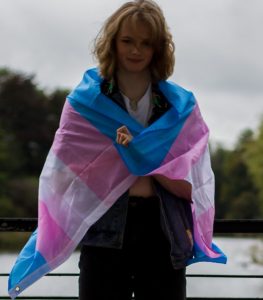
In the build-up to Coming Out Day, we offered advice and support to cyclist Emily Bridges, culminating in her decision to come out publicly as trans via a first-person article on Sky Sports. Beth Fisher’s interview with Emily that followed on ITV Wales was sensitive and informative. We wish Emily every happiness in university life and for the future.
Meanwhile, I was thankful for Thetford Town FC player-boss Matt Morton agreeing to be introduced to a national audience for the first time (he had previously shared his story of being gay in football in an interview with Bury Free Press sportswriter Liam Apicella). Like with Tom Beattie earlier in the year, learning about Matt’s journey was enlightening – both men have, commendably, embraced further opportunities to educate others about their experiences of being LGBT+ in football.
And last but by no means least, one of Sports Media LGBT+’s core network members chose our website for his own coming out story – British Athletics’ comms and content manager Gareth Burrell, also of the Athletics Pride Network, wrote beautifully about how seeing others displaying the confidence to be themselves inspired him to find his own voice. It was awesome to see the blog attract so much interest and praise for Gareth.
Must read: Coming Out Day: Athletics Pride Network’s Gareth Burrell shares his story
Rainbow Laces returns
Trans Awareness Week in November provided a chance to catch up with our former Authentic Me event speaker Charlie Martin, who continued to make tracks in motorsport despite the pandemic – she raced at the 24 Hours of Nurburgring, and will compete in the Britcar Endurance Championship in 2021.
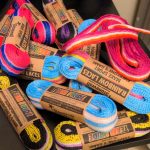
Then, for the eighth year, Rainbow Laces was back – and leading into it, there was a lot of uncertainty. With Britain in a second lockdown, what would the annual activation of the Stonewall campaign look like?
A new range of identity laces helped to inject enthusiasm and soon we were up and running – the first trans woman to work in the Premier League, Sophie Cook, won a British LGBT Award; while darts referee Huw Ware, boxer Kristen Fraser, and racing’s Victoria Smith all spoke about the impact of inclusion in their respective sports.
And there was much more to come…
Must read: ‘To transition, come back, and be accepted – I couldn’t ask for more’ (Sky Sports)
Captains lead by example
The LGBT+ in sport content just kept on coming in December for Rainbow Laces. For Goal, Emma Smith interviewed trans women footballers Alba Palacios and Sammy Walker; while in League Two, Exeter City’s media officer Craig Bratt and Cheltenham Town’s Danyal Khan produced an impressive range of content, speaking to players and fans connected with their clubs and showing why it’s important that inclusion is integral.
I particularly enjoyed chatting to University of Nottingham students’ union officers Sam Hawkins and Millie Doherty, who had been instrumental in activating the campaign on campus and had seen lots of engagement from all the clubs. Sam’s sport is trampolining, and that featured in a fun ‘I’m Game’ special as my Sky Sports colleague Mark McAdam took Liverpool legend Jamie Carragher to meet Luke Strong and try out a series of gymnastic challenges, as well as discuss how understanding around being LGBT+ in sport has improved considerably since Carra’s heyday as a player.
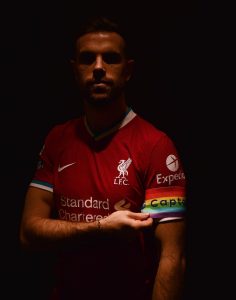
Meanwhile, the current Liverpool captain, Jordan Henderson, made an enormous impact with a quote tweet to a Reds fan from Ireland. For Keith Spooner, who had told Henderson what it meant to him to see the skipper wearing a rainbow armband, it’s an interaction he’ll never forget. Another Premier League star, Jamie Vardy, made a brilliant gesture when images of him sliding into a rainbow corner flag for his goal celebration were used to taunt Leicester’s LGBT fans group Foxes Pride – he signed the flag and told them to ‘keep up the good work’, which went even more viral than the GIFs.
Our Sky Sports digital content for Rainbow Laces in November and December brought in over 1m hits, well up on the same period in 2019. Stonewall’s polling also delivered improved numbers. Even though coronavirus made it more challenging, the campaign connected with the public once again, with one clear example being Tom Allen’s appearance alongside Mark on Soccer Saturday – it even got a mention on the Radio 1 Breakfast Show!
Must read: Engage and drive change, says Rainbow Laces campaign chief (Stonewall’s Robbie de Santos for Sky Sports)
Reminders and resolutions
Final thoughts! Among your Christmas movie screenings, many of you will have settled down to watch Happiest Season – the romantic comedy by writer / director Clea DuVall was a festive hit, and helped to make the yuletide gay.
When Abby (Kristen Stewart) gets frustrated by her girlfriend’s struggle to come out to her parents, her friend John (Dan Levy – essentially playing another version of David from Schitt’s Creek, which is no bad thing) reminds her how each LGBT+ person is unique but what binds us as a community is a universal emotion…
Everybody’s story is different. There’s your version and my version, and everything in between. But the one thing all of those stories have in common is that moment right before you say those words. When your heart is racing and you don’t know what’s coming next. That moment’s really terrifying! And once you say those words, you can’t un-say them. A chapter has ended, and a new one’s begun. You have to be ready for that. You can’t do it for anyone else.
John in Happiest Season
Our New Year resolutions? Try to make good decisions. Encourage others to do the same. And help more people write new chapters in their lives.
2021 – we’re ready for you!
Sports Media LGBT+ is a network, advocacy and consultancy group that is helping to build a community of LGBT+ people and allies in sport. We’re here to help. Learn more about us on our About page; to get in touch, Contact Us here.


